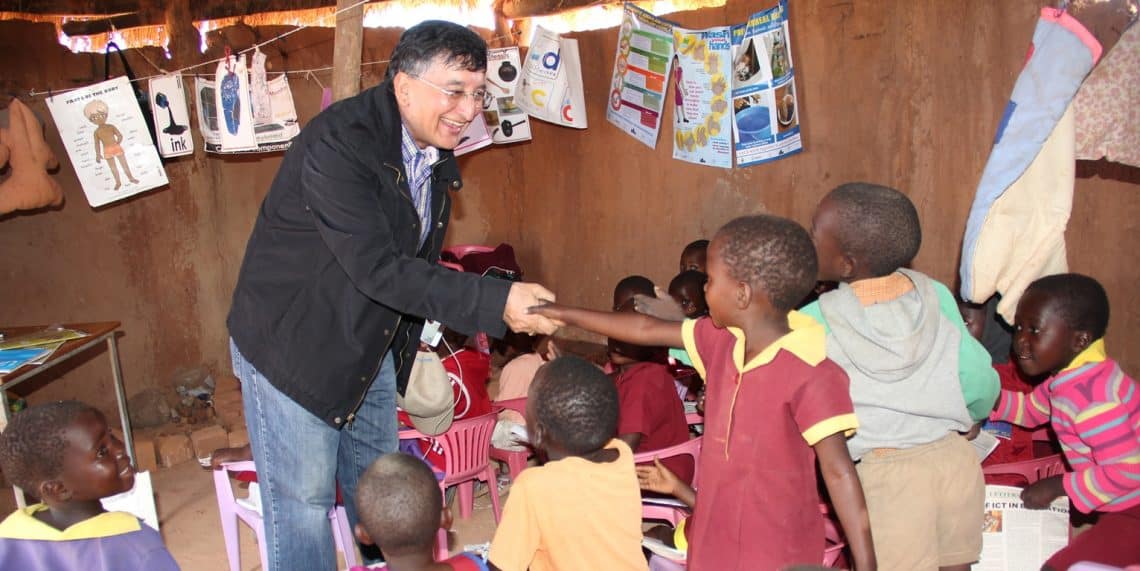By Sirak Gebrehiwot (UN Communications Specialist)
The UN team, led by the United Nations Resident Coordinator, Mr. Bishow Parajuli, comprising of UNICEF Representative, Dr. Mohamed Ag Ayoya; IOM Chief of Mission, Ms. Lily Sanya; WFP Representative and Country Director, Mr. Eddie Rowe; and UNDP Country Director Mr. Georges van Montfort concluded a three-day field visit, 9-11 July 2018, to UN-supported development programmes in Matebeleland North Province.
The visit included projects supporting health, nutrition, water, sanitation and hygiene, education, human rights as well as community asset creation and resilience building for food and nutrition security in Bulawayo, Lupane and Binga Districts.
Briefing the UN team on the third-day of the field visit, Ms Vannesa Nkomo, Binga District Nutritionist summed up the rural development programmes in Matebeleland North supported by the United Nations, “are addressing Sustainable Development Goals (SDGs) related to ending poverty (SDG 1), ending hunger (SDG2), achieving universal and quality health (SDG3), quality education (SDG4), improving access to water and sanitation (SDG6), and promoting peace, justice and strong institutions (SDG16).
During the three-day visit, the UN Team met and interacted with Provincial Administrators, District Administrators, representatives of Government Ministries, health and social workers, school principals, teachers, students, farmers and families benefiting from the harmonised social cash transfers (HSCT).
At the end of the three-day field visit, debriefing Local Administration officials in Binga, UN Resident Coordinator Mr. Bishow Parajuli said, “We are happy to note on the contributions the UN supported projects and the cooperation with the local administration, Government Ministries, non-governmental organisations and the communities, particularly in integrating the SDGs into local development projects, including health, education, social protection, human rights, community asset creation and resilience building programmes to enable vulnerable communities not only to achieve their right to development but also to adapt to effects of climate change.” “We equally learned on the need to intensify joint efforts including the engagement of private sector to address remaining challenges of providing pupils with adequate school facilities and to scale-up ongoing development programmes to support the rural communities achieve their local development plans in the shortest time possible,” said Mr. Parajuli.
On 9 July, the team visited United Bulawayo Hospital (UBH) where, through the Global Fund, UNDP supported the construction and provision of fittings for 350 m2 pharmacy cold chain facilities in Tshabalala Clinic, an incinerator at the NatPharm warehouse; and 11 solar installations in clinics in Bulawayo city under the solar for health initiative. United Bulawayo Hospital is a high-volume Antiretroviral site, with about 5000 patients on treatment being supported by Global Fund and other donors. Noting the impressive progress made to complete construction of the pharmacy warehouse, Mr. Georges van Montfort, UNDP Country Director said, “These improvements contribute in improving health services at the referral hospital, including intensifying the ongoing efforts of combating HIV and AIDS.”
HIV prevalence in Zimbabwe has decreased by 24% over the last decade and Zimbabwe is on course to achieve the global 90:90:90 targets by 2020, which currently stands at 74% of people living with HIV know their status, 87% of those who know their status receive treatment and 87% of those on treatment have their viral load suppressed.
The UN team proceeded to Ntabazinduna for a Human rights outreach clinic which was organized to provide information, counselling, legal aid and protection services to vulnerable and at-risk population in Zimbabwe. The initiative is supported by the Embassy of Sweden and the European Union. The IOM Chief of Mission in Zimbabwe, Ms Lily Sanya said, “The project brings together a consortium of 10 Civil Society Organizations, their network of partners and local authorities to contribute to improved dialogue and access to information on human rights and services to rural communities in remote areas. “
On 10 July, the UN team visited the Zimbabwe Resilience Building Fund (ZRBF) project at Tshonkongwe irrigation scheme in Jotsholo Matebeleland North. The 24.4 hectares scheme has 64 farmers, of which 24 are women each cultivating 0.4ha each. The farmers grow various crops including green mealies, maize, Michigan peas, and horticulture crops and market linkages are created to ensure off-take. The ZRBF supported by European Union, UK DFID, Sweden and UNDP targets 830,000 people in 18 rural labour endowed districts in the country. Mr Christopher Moyo, one of the farmers at the irrigation scheme said he makes about US$2 400 a year by selling his produce and with the money he can send his children to school as well as look after his family.
From Tshonkongwe the team went to ward 20 in Lubimbi, Binga where WFP and its partners supported the local community in constructing a dip tank. Kamombo dip tank brings relief to the community that used to drive their cattle for over 15km in one direction to the nearest dip tank. The construction of a dip tank has ensured regular dipping, thus enhancing the quality of cattle that will fetch better prices on the market. Mr. Eddie Rowe, WFP Representative and Country Director said, “since WFP commenced implementation of a multi-year strategic framework, communities are being supported to improve disaster risk reduction in all its dimensions of exposure, vulnerability and hazard characteristics; and building back better in a sustainable manner to achieve Zero hunger.”
On 11 July, the team visited social services that include health, nutrition, WASH, education and child protection. The first stop was at Donga Primary school where UNICEF has worked with the community and government department to build classroom blocks and toilets, a borehole, and provide textbooks, benches and ECD materials. Donga primary, one of the satellite schools being assisted with support from UK DFID, Germany and Global Partnership for education, has an enrolment of more than 200 students. Dr Mohamed Ag Ayoya, UNICEF Representative said, “he was impressed by the energy and dedication shown by the teachers and the parents and underlined that while progress has been made, there was still a lot to be done to make sure the schools are provided with proper facilities and children with the appropriate environment to learn qualitatively.”
The team proceeded to Simatelele clinic where they interacted with the health workers and witnessed mothers and children being assisted with nutrition, growth monitoring and learning about how to prepare nutritious-balanced food using locally available foods. The clinic is assisted under the health development fund (HDF) supported by UK DFID, EU, Sweden and Irish Aid. The last stop was Siachilaba village where the team visited the beneficiaries of the harmonised social cash transfers. The delegation visited 66-year-old Janet Mudimba who is one of the beneficiaries of the cash transfer programme and saw first-hand the positive impact that this programme have had on this chronically labour constrained household. Ms Mudimba is one of the over 300 000 people supported in 23 districts with monthly cash transfers.
The three-day the field visit, which followed the high-level review of the 2016-2020 Zimbabwe UN Development Assistance Framework (ZUNDAF) at mid-point held on 28 June, allowed the UN team to observe first-hand progress made on UN supported development projects within the commitment of the UN System under 2016-2020 ZUNDAF and engage communities to get their perspectives on the results of ongoing and completed UN supported recovery and development projects.






